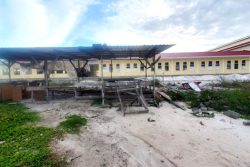The AFC is adamant in its refusal to join a pre-election coalition with old parties mired in old politics and its Acton Plan 2011 speaks of its seeking to establish “A liberal democratic culture for Guyana (based on) Western democratic political systems, such as Australia, the United States, Britain, New Zealand, Canada, India, Brazil and others.” These are however all essentially majoritarian systems with a commitment to political arrangements that are – in my view – fundamentally unsuited to an ethnically divided society such as ours. As a matter of fact, in many of its calculations, the AFC appears to view Guyana as if it is a, more or less, mature liberal democracy that could sustain ‘normal’ institutions. For example, only recently, its presidential candidate, defending his party’s support for the Broadcasting Bill and the level of executive control that Bill allows over the National Broadcasting Authority, reminded us that 95 percent of the proposed legislation came from a draft previously presented by the AFC and that the two Bills were almost identical, with the only differences being that the numbering was rearranged, a schedule moved and a few other minor changes. (“Broadcast law passes, splits opposition:” SN: 29/07/11).
 Though morally laudable, both the general history of societies like ours and our own past point to the likely failure of ventures that fail to adequately take into account divisive political environments. Commentators have long observed that the political context of most divided societies quickly overwhelm moderate forces in favour of the more traditional communal voices. In our specific context, the Working People’s Alliance has traditionally been a moderating voice and has suffered disappointment at the polls.
Though morally laudable, both the general history of societies like ours and our own past point to the likely failure of ventures that fail to adequately take into account divisive political environments. Commentators have long observed that the political context of most divided societies quickly overwhelm moderate forces in favour of the more traditional communal voices. In our specific context, the Working People’s Alliance has traditionally been a moderating voice and has suffered disappointment at the polls.
Nonetheless, it is said that one of the hallmarks of good management is the capacity to turn disadvantage into advantage and given the position of the AFC on coalition formation rather than the continual bickering, what is perhaps needed is a strategic alliance, of all opposition forces, which takes into consideration and tries to turn to advantage the perspectives of the various entities.
At the 2006 general election, the Alliance For Change won 5 seats, (27,397 votes) and most commentators believed that the vast majority of its support came from traditional PNC supporters and that it also contributed to the PPP/C winning a couple of regions (Regions 7 & 8) by taking votes from the PNC. Even so, I had tended to view the AFC as strategically more problematical for the PPP/C. After all, by providing an attractive alternative ‘home’ for traditional PNC supporters who had become disillusioned with that party, it obstructs the quest of the PPP/C for cross-over votes from that source and thus its aspirations to present itself as a multi-ethnic party.
I believe that if the opposition is focused upon wining an outright victory, a united opposition, which includes the AFC, is important (“A unitary opposition slate is a critical component if government is to be captured and governance transformed” SN: 13/08/2010). However, given the highly proportional nature of our electoral system, if one’s aim is mainly to prevent the PPP/C from gaining a majority, as I suspect is the AFC’s immediate goal, opposition votes can well be taken in totality with the added requirement that collectively they are able to wrench a few percentage (about 5%) points of votes from the PPP/C. In my view, though limited, this is not a regressive position particularly if the AFC sees the world as I believe it does.
From my standpoint, the party’s position that it will not join a pre-election pact with the PNC is more tactical than ideological, being based on a belief that Indians still fear or could be made to fear the PNC and that any association with that party will severely affect its capacity to gain sufficient votes to hold the balance it seeks. The talk of unwillingness to join with the PPP is simply thrown in as an indication of evenhandedness and as a signal to its African supporters who believe that the PPP is as guilty as the PNC for our current pathology. The point is that even if all the traditional PNC supporters who are said to have voted for it in 2006 return to the fold, if the AFC is able to wreak proportionally a similar type of damage to the PPP/C this year, its mission would be accomplished.
The AFC is committed to forming a government of national unity if it finds itself in a position to do so. Thus, far from their position being self-aggrandizing, it is a high risk game that could jeopardize the existence of the party for a limited objective, i.e. preventing the PPP/C from gaining a majority and creating the context for the establishment of a government of national unity.
Consider also that the PPP/C wants the TUF in the game as a spoiler for the Amerindian votes that would not only help it to retain control of the regions it has but may be able, as it did in 2006, to gain a national seat which is likely to be more useful after the 2011 poll. Similarly, it may be good politics to encourage the AFC to position itself to harass the flanks of the PPP/C: to be the ‘home’ for those PPP/C members who are disillusioned but would not want to be associated with the PNC and APNU. I do not believe that this strategy will succeed as I do not think that the AFC can do to the PPP/C in 2011 what it did to the PNC in 2006. However, even if my view is based upon a relatively good understanding of our history, it is still in the realm of speculation.
If the AFC succeeds in taking a sufficient number of traditional PPP/C votes, it would certainly undermine my contention that Guyana is a bi-communal society, even if it does not undercut the argument that ethnically divided societies should be managed in a consensual fashion. True, the party is not committed to radical constitutional change to introduce shared governance but only to forming a government of national unity if it finds itself in a position to do, and this is not surprising given its liberal democratic stance. Nonetheless, the AFC is gearing to take votes that would normally not go to the opposition and if it succeeds in doing so it would open a mammoth possibility for national renewal.







